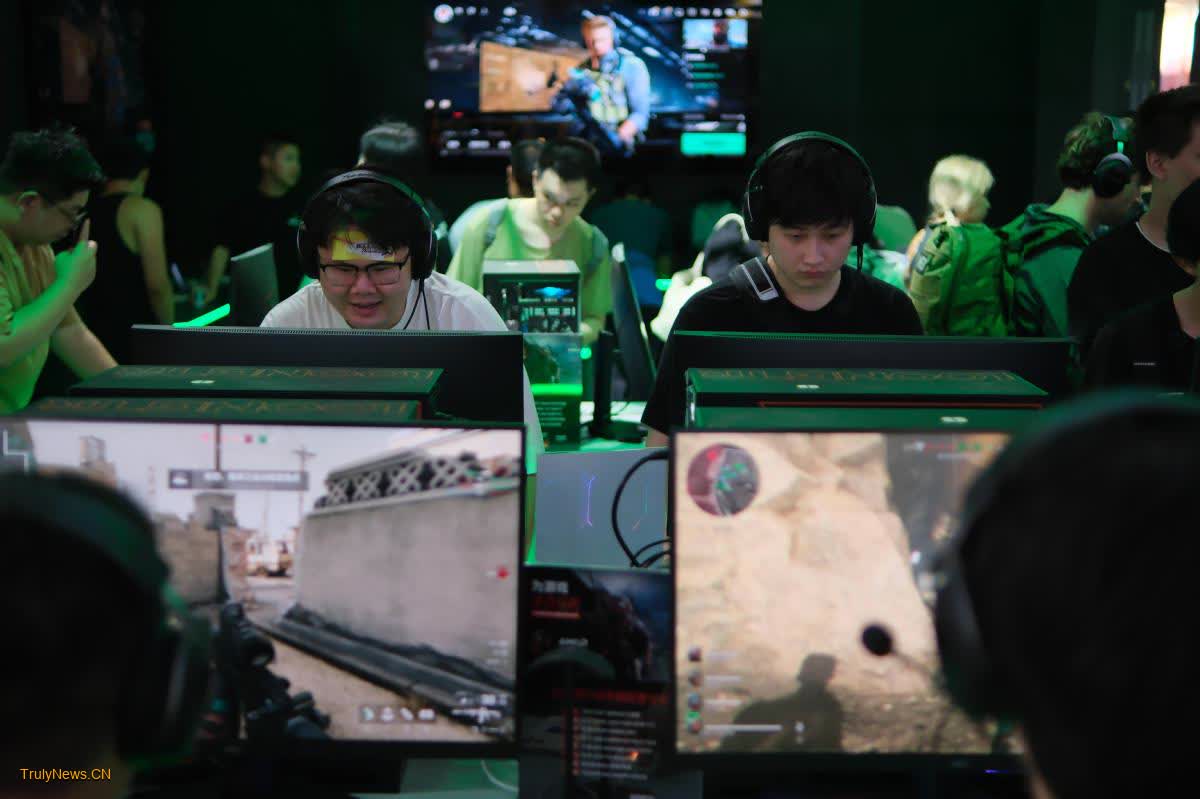
China now has the world’s most esports users and the sector is seeing continuous and steady expansion both at home and abroad, said industry experts and business leaders during the 21st China Digital Entertainment Expo and Conference, or ChinaJoy, which was held from Friday to Monday in Shanghai.
Currently, China is home to about 490 million esports enthusiasts, the world’s biggest user base, said a report released during ChinaJoy by the Electronics Sports Committee of the China Audio-Video and Digital Publishing Association.
In the first half, many local governments have rolled out preferential policies to boost esports development. The industry is seeing more diverse esports games and events, as well as wider and deeper international engagement, said Zhang Yijun, first vice-chairman of the association.
Domestic esports games recorded total revenue of 69.14 billion yuan ($9.54 billion) in the first six months, up 7.24 percent year-on-year. And revenue of the nation’s non-game related esports sector grew 4.43 percent on a yearly basis to 12.03 billion yuan, to which esports livestreaming contributed the lion’s share of 79.45 percent, said the report.
In the esports gaming sector, combat, multiplayer online battle arena (MOBA) and sports games remained the most popular categories. Mobile games are witnessing increasing popularity, as they took up 57.8 percent of the total, followed by client games accounting for 28.9 percent, according to the report.
In the domestic market,
Honor of Kings
,
Games for Peace
and
Teamfight Tactics
ranked the top three most popular games in the January-June period. In the client game category,
League of Legends
,
Crossfire
and
Counter-Strike: Global Offensive
raked in the most revenue in the Chinese market, said the report.
Offline esports events have also mushroomed across the country in the first half. A total of 72 official and professional serial events above the provincial level were held in China, with Shanghai hosting the most events — representing 27.1 percent of the total. Also, Shanghai is home to the nation’s most esports clubs, having 52 out of the nation’s total 195 clubs by the end of June, said the report.
During ChinaJoy, Perfect World Esports announced the launch of CS Major in Shanghai, which is the highest-level event of Counter-Strike and one of the most popular esports events in the world. The tournament will also mark its Asia debut in December.
China’s esports events are also making waves in overseas markets including Japan, Turkiye, Indonesia, Thailand, India and Brazil, attracting millions of overseas participants. Some events derived from Chinese self-developed esport games have become the most popular options in countries such as Indonesia, the Philippines and Malaysia, said the report.
Another report released by Mobvista, a leading Chinese mobile marketing platform targeting game developers, showed that downloads of Chinese mobile games have exceeded 22 billion overseas from January to June, another indication of Chinese mobile games’ increasing popularity across the globe.
It is worth noting that China’s self-developed esports games, such as
Honor of Kings
and
Mobile Legends: Bang Bang
, are officially included in the first ongoing Esports World Cup, which is running from July 3 to Aug 25 in Saudi Arabia.
“We can clearly see that esports have transcended the operation and promotion of games, and rapidly grown into an industrial ecology with independent influence, integrating sports, technology and culture. In the near future, esports will have a good chance to develop into a high-level sports industry with extensive global influence,” said Mars Hou, vice-president of Tencent Games and general manager of Tencent Esports.
Japanese video game company SNK is also sanguine on future prospects for China’s esports sector. Owning the intellectual property rights for over 200 games, SNK is widely known for its
The King of Fighters
,
Samurai Spirits
,
Fatal Fury
and
MetalSlug
series, captivating more than 200 million fans in China.
“We have seen esports events in the Chinese market growing faster and bigger each year. SNK is also working with notable Chinese local partners such as NetEase and Alisports to expand business and co-host esports events. Meanwhile, we are supporting clubs and teams to compete in Chinese and overseas events too,” said Kenji Matsubara, SNK’s president and CEO.
Matsubara said that all their efforts in the esports sector have continuously brought new fans to their IPs, and helped outstanding esports players shine on the global stage. Moreover, the company will launch a new esports brand — SCS — in China later this year, to further connect China to worldwide competitions.
Malaysia is eyeing closer connection with China’s esports sector as well.
Gan Dong Chee, co-founder of Malaysia’s Magnus Games Studio, said they actually see unique advantages of Chinese games in the Malaysian market, such as the cultural connections between the two nations. As a frequent exhibitor during ChinaJoy, he is looking to expand cooperation with more Chinese partners, and introduce more Chinese games to his nation.
Muhammad Naim Al Amin bin Dato’ Saharudin, president of the Malaysian Esports Federation, said: “Chinese games are performing very well in the Malaysian market, especially mobile games. Nearly half of the population in Malaysia are game players, and millions of them are active game users, contributing about $500 million in game purchases per year.”
He pointed out that Malaysia is actively promoting the development of esports, inviting esports game developers and event organizers as well as investors from China to expand in the market.